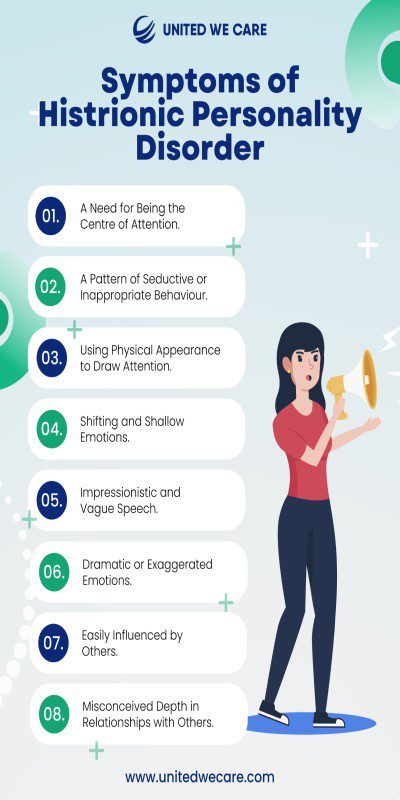What is Histrionic Personality Disorder?
Histrionic Personality Disorder is a Cluster B personality disorder. Simplified, this is a chronic mental illness that causes a person to develop maladaptive patterns of behavior. These patterns are marked by inappropriate, volatile emotionality and often unpredictable behavior.
Living with such a health condition can have a negative impact on your interpersonal relationships, self-image, and ability to function. This article will suggest some self-help strategies that you can use in addition to professional treatment to cope better.
Histrionic Personality Disorder Symptoms
Essentially, an individual needs to display at least five or more of the following symptom categories to be diagnosed with histrionic personality disorder. The DSM 5 has laid out the below-mentioned symptoms as diagnostic criteria [1].

A Need for Being the Centre of Attention
Firstly, the individual experiences emotional discomfort if they are not the center of attention. They take it personally if they are not praised or acknowledged by others.
A Pattern of Seductive or Inappropriate Behaviour
Inappropriate flirting and sexually inviting behavior are characteristic traits of individuals with histrionic personality disorder. The person may even seduce others as a way to manipulate them.
Using Physical Appearance to Draw Attention
Similarly, someone with histrionic personality disorder might have a pattern of dressing extravagantly or inappropriately for attention. It’s more about getting noticed than expressing their identity.
Shifting and Shallow Emotions
Typically, the individual appears to only have superficial emotions. Moreover, these feelings keep shifting from one extreme to the other very rapidly.
Impressionistic and Vague Speech
Usually, individuals with histrionic personality disorder speak in an exaggerated way. Their words are more focused on their emotional reaction than actual facts. This makes their speech pretty vague.
Dramatic or Exaggerated Emotions
Additionally, the person expresses disproportionately intense emotions for situations that aren’t that big of a deal. At times, it may seem like they are making a mountain out of a molehill.
Easily Influenced by Others
Interestingly, people suffering from histrionic personality disorder are usually quite impressionable. For example, they tend to swiftly change stances, especially when influenced by others.
Misconceived Depth in Relationships with Others
Finally, histrionic personality disorder makes an individual think that their relationship with someone is deeper than it actually is. This leads to them frequently getting hurt or offended when the other person doesn’t behave as expected.
Causes of Histrionic Personality Disorder
Like most personality disorders, it is not explicitly known what causes histrionic personality disorder. However, there are some theories backed by research studies as to why a person develops this condition.
Childhood Abuse & Neglect
Commonly, abuse and neglect are well-established precursors to personality disorders. This is because the maladaptive patterns of the disorder may, in some ways, protect the child from further mistreatment.
For instance, a recent study [2] suggests that child sexual abuse is the strongest predictor of histrionic personality pathology in adulthood. Additionally, physical as well as emotional neglect can cause a child to develop this disorder in early adulthood.
Genetics
Generally, personality disorders also have an etiology based on genetics. According to this scientific publication [3], genetic factors contribute to around fifty percent of the variation in the development of personality disorders.
Nevertheless, it is important to understand that having a genetic disposition only makes one susceptible to the disorder. If a child is raised in an environment that is safe and adaptable based on their needs, they may very well never develop histrionic personality disorder.
Parenting Styles
Furthermore, experts believe that parenting styles play a crucial role in the development of histrionic personality disorder [1]. Children pick up if parents, too, have a tendency to be dramatic, erratic, volatile, or show inappropriate sexual behavior.
Parenting styles that lack boundaries are over-indulgent or inconsistent may predispose children to develop histrionic personality disorder.[4]
Histrionic Personality Disorder Treatments
Thankfully, there are several kinds of treatments available for dealing with histrionic personality disorder. Here are some of the best evidence-based treatments.
Psychotherapy
Ideally, the best and most effective treatment for histrionic personality disorder is an eclectic approach in psychotherapy. A treatment with a fundamentally psychodynamic approach can go a long way in patient recovery [5].
Nevertheless, this approach also benefits from the combination of newer treatment approaches, such as dialectic behavior therapy for distress tolerance and acceptance and commitment therapy for interpersonal issues.
Group & Family Therapy
Some treatment modules can be done in group settings. Group therapy can involve more than one therapist working with several individuals dealing with similar issues. Sessions are designed to address specific topics.
Family therapy, on the other hand, is a combined session for you and your family members. This helps everyone understand the problems in a more detailed way and find sustainable and effective solutions for them.
Medication
Ordinarily, since personality disorders are chronic in nature, individuals benefit from the combination of psychotherapy and pharmacotherapy. Psychiatrists prescribe medication for histrionic personality disorder based on the symptom presence and severity.
Disturbances in mood are generally treated with SSRIs or anti-depressants. But more aggressive symptoms such as impulsivity and suicidality are treated with varying doses of lithium and antipsychotics [6].
Self-help Strategies for Daily Management for Histrionic Personality Disorder
Naturally, it is difficult to live with a chronic mental illness like histrionic personality disorder. Fortunately, there are personal strategies that you can do on your own in addition to your treatment and professional help.
Journalling and Doodling
This may seem generic, but journalling is a super effective tool for this condition. You allow yourself to analyze your perceptions from a third-person perspective when you scribble. It is an excellent way of venting raw thoughts and giving yourself more time for reflection before acting impulsively.
Doodling, too, is an alternative if you don’t feel like you can articulate through words. Sometimes, it’s easier to draw your emotions to understand them. These tools give you a non-judgemental space to exaggerate your expression and let it all out without negative consequences.
Cultivating Self-Compassion
One must remember that at the crux of most cluster B personality disorders is a diminished sense of self-worth. The best way to counter that is to include activities that cultivate self-compassion in your daily routine.
Self-compassion requires one to start replacing self-criticism with kinder thoughts. You need to monitor the narrative in your head, catch yourself being mean, and then talk to yourself with love. It gets easier with practice.
Self-Care Toolkit
Your self-help strategies for histrionic personality disorder shall remain incomplete without a carefully curated arsenal of self-care techniques that work specifically for you. It’s recommended to make it as customized as possible for your unique needs and requirements.
Remember the seven pillars of self-care when choosing which methods to include. Firstly, your bodily needs, such as nutrition, rest, and movement, need daily care. Secondly, you need to invest in meaningful relationships. Lastly, self-care requires looking for creativity, inspiration, and purpose.
Conclusion
Histrionic personality disorder can be very challenging to live with because of the interpersonal issues involved. The long-term maladaptive patterns make it hard for one to find acceptance and support. While there are various kinds of treatment available, one can always benefit from having more hands-on self-help tools.
Some self-help strategies for histrionic personality disorder include journalling and doodling to channel thoughts and feelings. One can also start practicing self-compassion with intention. Moreover, self-care strategies like looking after the body’s needs, investing in meaningful relationships, and developing a rich inner life help immensely as well.
You can always contact our experts at United We Care for more suggestions and targeted strategies for your symptoms and challenges. At United We Care, we are committed to providing you with the best solution for your overall well-being.
References
[1] French JH, Shrestha S. Histrionic Personality Disorder. [Updated 2022 Sep 26]. In: StatPearls [Internet]. Treasure Island (FL): StatPearls Publishing; 2023 Jan-. Available from: https://www.ncbi.nlm.nih.gov/books/NBK542325/
[2] Yalch, M.M., Ceroni, D.B. and Dehart, R.M. (2022a) ‘Influence of child abuse and neglect on histrionic personality pathology’, Journal of Trauma & Dissociation, 24(1), pp. 111–124. doi:10.1080/15299732.2022.2119458.
[3] TORGERSEN, S. (2009) ‘The nature (and nurture) of personality disorders’, Scandinavian Journal of Psychology, 50(6), pp. 624–632. doi:10.1111/j.1467-9450.2009.00788.x.
[4] Morrison, J. (1989) ‘Histrionic personality disorder in women with somatization disorder’, Psychosomatics, 30(4), pp. 433–437. doi:10.1016/s0033-3182(89)72250-7.
[5] Horowitz M. J. (1997). Psychotherapy for histrionic personality disorder. The Journal of psychotherapy practice and research, 6(2), 93–107.
[6] HORI, A. (1998) ‘Pharmacotherapy for personality disorders’, Psychiatry and Clinical Neurosciences, 52(1), pp. 13–19. doi:10.1111/j.1440-1819.1998.tb00967.x.










